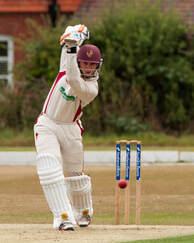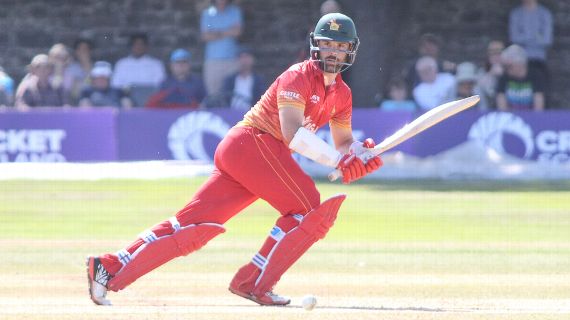
Former South Wilts and Sarisbury Athletic spin all-rounder Ryan Burl is one of the players affected following Zimbabwe Cricket’s suspension by the ICC, their accounts frozen and their teams banned from events.
The 25-year old, who spent three formative seasons playing in the Southern Premier League, is living in cricketing purgatory, stuck alongside his Zimbabwean teammates; he knows neither one thing nor another, only that his professional career is effectively on hold, at the mercy of administrators.
He is experiencing one of sport’s brutal quirks – the playing staff punished for the actions of those beyond the pitch. As he talks, there is an audible puff of the cheeks – an emotional sigh that is feeling the effects of a week of turmoil.
“It’s hard to respond, to be honest,” admits Burl. “We’re quite speechless. We don’t know what’s happening.
“Nobody dreams of having their careers shortened because of corruption. Nobody even plans for that because it’s not even a realistic idea that you have in your mind.”
Following a meeting in London, Zimbabwe’s ICC membership has been suspended due to alleged external influence and meddling in the country’s cricketing affairs.
It is a charge denied by Kirsty Coventry, the former Olympic medal-winning swimmer who now chairs the nation’s Athletes Commission in the International Olympic Committee. “There has been no government interference,” she tweeted when the judgement was made.
Board disbanded
The issue appears to centre around the involvement of the Sports and Recreation Commission (SRC), a body independent of the government, which oversees the running of Zimbabwe’s sporting associations to prevent poor governance.
As part of its brief, the SRC took the decision to disband the entire Zimbabwe Cricket Board. The ICC has now demanded that the previous board is reinstated by October 8 in order for the game’s global governing body to review the case at a meeting four days later.
For Burl, however, beyond the administrative chaos around which this suspension has been based, lies a human story which risks being overlooked. There are livelihoods at stake, families to look after, jobs on the line.
“It feels like sometimes we are political pawns in their chess game,” he confesses of a period that has left him and his colleagues angry, anguished and confused.
It has been more than two months since Burl, who made his Test debut against South Africa in December 2017 , was last paid any of his salary; he believes it is nearing half a year since he received a match fee.
“It’s extremely worrying because about 90 percent of cricketers in the country are relying primarily on the income of Zimbabwe Cricket,” he says.
“It’s not a pleasant thing to hear that you’re not going to get paid for all the work that you have been doing and the time that you’ve sacrificed.
“It’s not just us that we’ve got to look after; everyone’s got a wife or a child or their mum and dad. There’s a lot of dependence on that salary. It falls on more than just you or the 100 or so cricketers in the country – there are a lot of mouths that need to be fed.”
At 25 years of age, Burl is among the new generation of Zimbabwean cricketers. He is spending his summer at Haslingden in the Lancashire League, while he represented his country during their recent tours of Ireland and the Netherlands.
The 25-year old, who spent three formative seasons playing in the Southern Premier League, is living in cricketing purgatory, stuck alongside his Zimbabwean teammates; he knows neither one thing nor another, only that his professional career is effectively on hold, at the mercy of administrators.
He is experiencing one of sport’s brutal quirks – the playing staff punished for the actions of those beyond the pitch. As he talks, there is an audible puff of the cheeks – an emotional sigh that is feeling the effects of a week of turmoil.
“It’s hard to respond, to be honest,” admits Burl. “We’re quite speechless. We don’t know what’s happening.
“Nobody dreams of having their careers shortened because of corruption. Nobody even plans for that because it’s not even a realistic idea that you have in your mind.”
Following a meeting in London, Zimbabwe’s ICC membership has been suspended due to alleged external influence and meddling in the country’s cricketing affairs.
It is a charge denied by Kirsty Coventry, the former Olympic medal-winning swimmer who now chairs the nation’s Athletes Commission in the International Olympic Committee. “There has been no government interference,” she tweeted when the judgement was made.
Board disbanded
The issue appears to centre around the involvement of the Sports and Recreation Commission (SRC), a body independent of the government, which oversees the running of Zimbabwe’s sporting associations to prevent poor governance.
As part of its brief, the SRC took the decision to disband the entire Zimbabwe Cricket Board. The ICC has now demanded that the previous board is reinstated by October 8 in order for the game’s global governing body to review the case at a meeting four days later.
For Burl, however, beyond the administrative chaos around which this suspension has been based, lies a human story which risks being overlooked. There are livelihoods at stake, families to look after, jobs on the line.
“It feels like sometimes we are political pawns in their chess game,” he confesses of a period that has left him and his colleagues angry, anguished and confused.
It has been more than two months since Burl, who made his Test debut against South Africa in December 2017 , was last paid any of his salary; he believes it is nearing half a year since he received a match fee.
“It’s extremely worrying because about 90 percent of cricketers in the country are relying primarily on the income of Zimbabwe Cricket,” he says.
“It’s not a pleasant thing to hear that you’re not going to get paid for all the work that you have been doing and the time that you’ve sacrificed.
“It’s not just us that we’ve got to look after; everyone’s got a wife or a child or their mum and dad. There’s a lot of dependence on that salary. It falls on more than just you or the 100 or so cricketers in the country – there are a lot of mouths that need to be fed.”
At 25 years of age, Burl is among the new generation of Zimbabwean cricketers. He is spending his summer at Haslingden in the Lancashire League, while he represented his country during their recent tours of Ireland and the Netherlands.
Recent results have been poor; the tourists lost all five ODIs across those two trips. That, however, pales into relative insignificance when faced with the uncertainty at play here.
In amongst an experienced line-up, including Brendan Taylor, Craig Ervine (ex-Lymington) and Sikandar Raza Butt, Burl’s concern is of the future, of what happens next should the worst come to fruition, of where he will go, of what he will do, of what will lie ahead for a proud cricketing nation.
A community that can lay claim to Andy and Grant Flower, to Heath Streak, to Henry Olonga, to Dave Houghton and so many others.
“It’s unbelievable,” he reflects. “The way I see it is that if we get expelled now, Zimbabwe Cricket is screwed for at least four years. That’s us done.
“It’s worrying because it’s affecting the guys that are coming through the ranks – the guys who are 17, 18, 19 are going to miss out.
“They wouldn’t be able to pursue cricket in Zimbabwe and they’ll just fall off the radar and it’s upsetting because it could just skip a whole generation.
“Even though, as it stands, there are quite a lot of guys in our squad that probably only have a few years left at the top, these guys like Brendan and Sikandar want to leave Zimbabwe Cricket in a better place, but they have been unable to do so because it’s out of their hands.
“It’s not the way it should be; we should just be here playing cricket, which is what we’re good at. We’re not good at politics – that’s not our job.
“The whole cricket side of it is being taken away from us, so we can’t even do what we’re good at or what we were born to do. It’s frustrating because at the moment it’s just politics and politics.”
*This article appears courtesy of The Cricketer magazine.
In amongst an experienced line-up, including Brendan Taylor, Craig Ervine (ex-Lymington) and Sikandar Raza Butt, Burl’s concern is of the future, of what happens next should the worst come to fruition, of where he will go, of what he will do, of what will lie ahead for a proud cricketing nation.
A community that can lay claim to Andy and Grant Flower, to Heath Streak, to Henry Olonga, to Dave Houghton and so many others.
“It’s unbelievable,” he reflects. “The way I see it is that if we get expelled now, Zimbabwe Cricket is screwed for at least four years. That’s us done.
“It’s worrying because it’s affecting the guys that are coming through the ranks – the guys who are 17, 18, 19 are going to miss out.
“They wouldn’t be able to pursue cricket in Zimbabwe and they’ll just fall off the radar and it’s upsetting because it could just skip a whole generation.
“Even though, as it stands, there are quite a lot of guys in our squad that probably only have a few years left at the top, these guys like Brendan and Sikandar want to leave Zimbabwe Cricket in a better place, but they have been unable to do so because it’s out of their hands.
“It’s not the way it should be; we should just be here playing cricket, which is what we’re good at. We’re not good at politics – that’s not our job.
“The whole cricket side of it is being taken away from us, so we can’t even do what we’re good at or what we were born to do. It’s frustrating because at the moment it’s just politics and politics.”
*This article appears courtesy of The Cricketer magazine.



